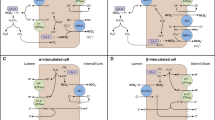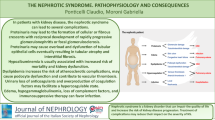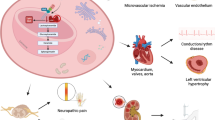Abstract
Oxalate nephropathy is associated with hereditary hyperoxaluria, Crohn disease, and previous gastric or intestinal surgery, especially in the setting of increased oxalate intake or ethylene glycol ingestion. We present a patient whose intake of vitamin C supplements (2 g/day), exacerbated by predisposing factors of prior small bowel obstruction and resection, and benign prostate hyperplasia (BPH), resulted in acute kidney injury due to oxalate nephropathy. We review past reports of vitamin C-induced oxalate nephropathy and discuss the underlying precipitating factors.

Similar content being viewed by others
References
Stokes MB. Acute oxalate nephropathy due to ethylene glycol ingestion. Kidney Int. 2006;69:203.
Gurm H, Sheta MA, Nivera N, et al. Vitamin C-induced oxalate nephropathy: a case report. J Community Hosp Intern Med Perspect. 2012. https://doi.org/10.3402/jchimp.v2i2.17718.
Lamarche J, Nair R, Peguero A, et al. Vitamin C-induced oxalate nephropathy. Int J Nephrol. 2011;2011:146927.
Poulin LD, Riopel J, Castonguay V, et al. Acute oxalate nephropathy induced by oral high-dose vitamin C alternative treatment. Clin Kidney J. 2014;7:218.
Cossey LN, Rahim F, Larsen CP. Oxalate nephropathy and intravenous vitamin C. Am J Kidney Dis. 2013;61:1032–5.
Wong K, Thomson C, Bailey RR, et al. Acute oxalate nephropathy after a massive intravenous dose of vitamin C. Aust N Z J Med. 1994;24:410–1.
Duffey BG, Alanee S, Pedro RN, et al. Hyperoxaluria is a long-term consequence of Roux-en-Y Gastric bypass: a 2-year prospective longitudinal study. J Am Coll Surg. 2010;211:8–15.
Chaudhari D, Crisostomo C, Ganote C, et al. Acute oxalate nephropathy associated with orlistat: a case report with a review of the literature. Case Rep Nephrol. 2013; 2013:124604.
Hellman L, Burns JJ. Metabolism of l-ascorbic acid-1-C14 in man. J Biol Chem. 1958;230:923–30.
Levine M, Conry-Cantilena C, Wang Y, et al. Vitamin C pharmacokinetics in healthy volunteers: evidence for a recommended dietary allowance. Proc Natl Acad Sci USA. 1996;93:3704–9.
Knight J, Madduma-Liyanage K, Mobley JA, et al. Ascorbic acid intake and oxalate synthesis. Urolithiasis. 2016;44:289–97.
Verkoelen CF, Verhulst A. Proposed mechanisms in renal tubular crystal retention. Kidney Int. 2007;72:13–8.
Lawton JM, Conway LT, Crosson JT, et al. Acute oxalate nephropathy after massive ascorbic acid administration. Arch Intern Med. 1985;145:950–1.
McHugh GJ, Graber ML, Freebairn RC. Fatal vitamin C-associated acute renal failure. Anaesth Intensive Care. 2008;36:585–8.
Mousson C, Justrabo E, Rifle G, et al. Piridoxilate-induced oxalate nephropathy can lead to end-stage renal failure. Nephron. 1993;63:104–6.
Rathi S, Kern W, Lau K. Vitamin C-induced hyperoxaluria causing reversible tubulointerstitial nephritis and chronic renal failure: a case report. J Med Case Rep. 2007;1:155.
Nasr SH, Kashtanova Y, Levchuk V, et al. Secondary oxalosis due to excess vitamin C intake. Kidney Int. 2006;70:1672.
Alkhunaizi AM, Chan L. Secondary oxalosis: a cause of delayed recovery of renal function in the setting of acute renal failure. J Am Soc Nephrol. 1996;7:2320–6.
Worcester EM. Stones from bowel disease. Endocrinol Metab Clin N Am. 2002;31(4):979–99.
Acknowledgements
The authors are grateful to Bhuvaneswari Krishnan MD for pathology interpretation and Divya Janardhanan MD and Saed Shawar MD for their assistance in the medical care of this patient.
Author information
Authors and Affiliations
Corresponding author
Ethics declarations
Conflict of interest
The authors have declared that no conflicts of interest exists.
Human and animal rights
This article does not contain any studies with human participants or animals performed by any of the authors.
Informed consent
The subject’s identity has been masked. No identifying details are included in this manuscript to ensure complete anonymity.
About this article
Cite this article
Lin, W.V., Turin, C.G., McCormick, D.W. et al. Ascorbic acid-induced oxalate nephropathy: a case report and discussion of pathologic mechanisms. CEN Case Rep 8, 67–70 (2019). https://doi.org/10.1007/s13730-018-0366-6
Received:
Accepted:
Published:
Issue Date:
DOI: https://doi.org/10.1007/s13730-018-0366-6




